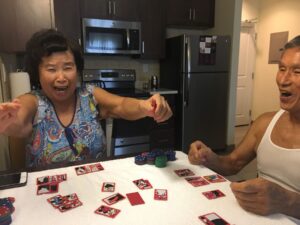As children grow into adults, parental guidance shifts from directing to mentoring, requiring a delicate balance between sharing wisdom and respecting independence. Shifting from making decisions to offering support demands sensitivity to boundaries. Here, I’ll share my journey as an adult child still navigating parental advice and my approach in guiding my own adult children while experiencing parental influence firsthand.
My Journey with Overprotective Parents
Navigating parental guidance into adulthood proves complex, especially when it persists as a frustrating experience. Even in my fifties, my parents, in their late eighties, continue to offer overwhelming advice, often leaving me feeling disempowered. Their caring intentions stem from the belief that their guidance ensures a better life for me. This dynamic has been a constant since childhood, resurfacing when I returned to live nearby, straining our relationship and affecting my emotional well-being.
Cultural factors add complexity, as many Asian families tend toward overprotectiveness and prolonged guidance into adulthood. Consequently, their continuous intervention leaves me feeling inadequate and invalidated in managing my life. Despite recognizing their good intentions, their interference stifles my autonomy, impacting both my independence and our familial ties.
Their disagreement regarding my life choices adds layers of complexity to our relationship. They tend to oppose crucial decisions, encompassing my relationships, career choices, and future plans. These differences often sparked heated discussions, straining our relationship as they perceived my choices as misguided despite my unwavering conviction.
Effects of Overbearing Parenting on My Life
The overbearing parenting style profoundly affects various aspects of my life. Continuous interference from my elderly parents strains communication, making it difficult to discuss personal decisions or emotions openly. This fosters frustration and emotional distance. Moreover, their consistent invalidation of my choices fuels self-doubt, significantly impacting my confidence and personal growth.
Growing up in this environment cultivates an internal conflict, leading to a struggle between seeking parental approval and asserting independence. This inner battle clouds my decisions, leaving me uncertain as I try to balance their input with my desire for autonomy.
Consequently, this tension takes a toll on my emotional well-being. Juggling personal aspirations while seeking parental validation induces stress and anxiety, making it challenging to find peace and confidence in my decisions.
Their well-meaning but conflicting advice strains our bond, making it hard to balance autonomy with their concern. It shapes not just my choices but our interactions, leading to frustration. This ongoing struggle illustrates the complexity of guiding adult children amidst family expectations and personal goals.
Guiding My Adult Children with Respect and Autonomy
Having experienced the impact of overbearing parenting in my own life, I’m determined not to replicate those dynamics with my daughters. As they navigate adulthood and prepare to graduate from college, my goal is to support them without suffocating their independence. I strive to foster open communication channels, offering guidance when asked for, striking a balance between sharing insights and allowing them the autonomy to shape their own paths.
In guiding adult children, I’ve learned that respecting their individuality and acknowledging their decision-making abilities is paramount. Additionally, I try to encourage critical thinking and lead by example, empowering them to make informed choices. Clear boundaries separate supportive guidance from controlling behavior, ensuring their personal decisions are honored.
Furthermore, I steer away from imposing my own aspirations onto them, valuing their unique journeys. Instead, I focus on fostering self-reliance, embracing mistakes as learning opportunities, and providing emotional support rather than dictating their choices. Seeking their consent before offering advice ensures that my guidance is welcome and not imposed, maintaining a respectful and healthy dynamic in our relationship.
I recognize I’m not flawless in my parenting. There were instances when I pushed my views, like advocating for a plant-based diet, without honoring their decisions about healthy eating habits. Through these experiences, I’ve learned the importance of respecting their choices.
Effective Approaches for Guiding Adult Children
Guiding adult children through their journey into independence requires understanding and effective approaches. Here, I share practical strategies that have supported my own children in their path to autonomy.

1. Open Communication
Create a safe, judgment-free space where adult children feel comfortable sharing their thoughts and seeking guidance. Additionally, actively listen, validate their perspectives, and avoid immediately offering solutions. Set aside dedicated time for discussions to normalize seeking guidance and ensure they feel heard and supported.
2. Respect Autonomy
Recognize their independence and capabilities by providing advice without trying to control or judge their decisions. Offer guidance as support rather than a means of directing their choices, respecting their autonomy throughout the conversation.
3. Offer Supportive Guidance
Offer guidance and insights when requested, focusing on being supportive rather than taking control. Be available to provide assistance, emphasizing a supportive stance that respects their autonomy and decisions, rather than imposing your ideas.
4. Set Clear Boundaries
Set clear boundaries that honor their independence while fostering mutual respect during discussions. Ensure that conversations maintain a respectful tone, allowing space for their viewpoints while also asserting your own, creating a balanced dialogue without dominance.
5. Encourage Critical Thinking
Encourage critical thinking and informed decision-making by engaging in discussions that prompt them to consider various viewpoints. Additionally, ask questions that encourage reflection and exploration of different angles, fostering their ability to think critically and make well-informed choices.
6. Celebrate Independence
Promote self-reliance by celebrating their accomplishments and milestones, boosting their confidence in what they can achieve. Furthermore, by acknowledging their successes, you reinforce their belief in their own abilities and encourage them to continue striving independently.
7. Respect Individuality
Respect their unique individuality by refraining from imposing your own desires or expectations on them. Instead, acknowledge and honor their distinct traits and choices, allowing them the freedom to follow their own path without undue influence from external pressures.
8. Provide Emotional Support
Provide emotional support by creating a safe environment where they feel comfortable expressing thoughts and feelings without fear of judgment. Also, offer understanding and a listening ear, ensuring they feel validated and supported in sharing their emotions and concerns.
9. Seek Consent
Before giving advice, check if they’re open to hearing your thoughts, ensuring that your guidance is welcomed rather than forced. Respect their boundaries by confirming their willingness to receive your input, creating a space where they feel comfortable seeking guidance.
Balancing guidance and autonomy in guiding adult children are a delicate yet crucial task. Respecting their choices while offering support lays the groundwork for a healthy relationship based on mutual trust and understanding. Remember, it’s about being there when needed while allowing them the freedom to navigate their own paths, fostering independence and confidence along the way.
For a deeper dive into how overprotective parenting has shaped my life, explore my earlier piece titled “Overprotective Parenting: Its Impact on My Life.“














